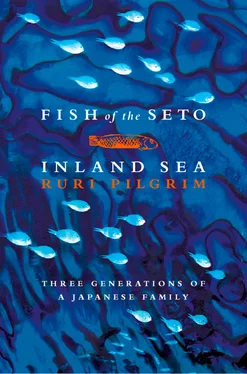Standing on the beach, Haruko saw the columns of black smoke far away above the horizon, and heard a man mutter, âThank God, they came this way.â
The news that Haruko and the servant had been down to the beach to see the dead body had already reached home by the time they entered the house.
âWhat have you been up!â Ayako sighed and smiled at the same time. âCanât you behave like a girl?â
âHow can you go and see a body!â Takeko made a show of shuddering and covered her mouth with both hands in a gesture of horror.
Haruko ignored her sister. She did not dislike Takeko, who was two years older, but she could not respect her.
In the morning, Takeko often said, âI donât feel well,â before setting off for school. âIn that case, you had better stay at home,â her Miwa grandmother, would say and Takeko would stay at home. After all, she was a girl; she did not need an education. As a girl of a well-to-do and long-established family she would have good marriage prospects if she was pretty, and that was all that mattered. Even at school, Takeko often said she felt ill and went home, leaving her books and other belongings for Haruko to bring back later.
For Haruko, school was important. Besides, she enjoyed it. The work was easy for her. She could dominate the village rascals in the classroom. She was given prizes. And she always finished her homework before the lesson was over.
That night, the Miwa children sat on cushions placed on the tatami floor while their father had his dinner. The children usually finished their meal early around a big table with their mother. A maid sat and attended them. Shintaro had his meal later, attended by his wife. He had a small table to himself, and Ayako sat by a little rice tub with a tray on her lap. The dishes were more elaborate than for the earlier gathering. There was soup in a black lacquered bowl with gold and silver chrysanthemums painted on it, a broiled fish with garnish and more plates of vegetables in season. Saké was served as well. As Shintaro ate, he talked to his children.
âAnd what did you see in the pendant that you were peeping in?â he asked Haruko that night. He had seen her on the beach.
âI saw a lady. Is she Russian?â Haruko relaxed. She was not going to be scolded.
âVery likely. She must be his wife or fiancée.â
âShe had jewels around her neck.â
âDid you like them?â
âThe jewels? I donât know,â she said. They had seemed so unreal that she had no feelings except awe. Shintaro laughed.
âWhat is a pendant?â Takeko wanted to know.
âRussians are enemy,â three-year-old Sachiko said.
âHaruko.â Her father called her as she was getting ready to go to school the next day. âI want you to come with me to the Russian hospital ship today. I will send someone to fetch you from school.â
âBut I cannot miss school.â It was an awful dilemma. To miss school was bad. On the other hand, she had been told that her fatherâs word was absolute.
âI will send a note to the teacher. It is to help me visit the wounded and make them feel better.â
âRussians?â Ayako opened her eyes wide with astonishment. She forgot her usual modesty in front of her husband and protested, âYou cannot go to the enemy place with a little girl. They will kill you.â
âNo, no. They will not kill us. They are doctors like me and their patients.â
Ayako was not totally convinced but did not say any more.
âIn foreign countries,â Shintaro explained gently, âit is the wifeâs duty to go with her husband on such occasions.â
âWife!â
âYes. Wife. You see, in foreign countries, wives attend dinner parties looking like the lady that Haruko saw in the pendant, and are able to carry on conversations with other men.â
âDo foreign women eat with men from the same table?â
âYes, they do.â
âWhy?â
âBecause they think it is sociable.â
Most of Shintaroâs knowledge of life in Russia came from reading translations of novels by writers such as Dostoyevsky and Tolstoy.
Although she did not understand why Shintaro wanted to take Haruko to see the Russians, Ayako had Harukoâs special kimono, which was kept for New Yearâs Day, spread out on the tatami floor and dressed her daughter.
âYou must stay with your otohsan. I heard that foreign men have hair all over their body like animals,â she told Haruko. A rickshaw came and Haruko climbed up after her father. He held her in front of him. She was almost hidden behind a large bunch of flowers that the servant handed to her.
âForeign wives are like geishas,â Ayako confided to her maid, Kiyo, later.
The hospital ship was a small vessel of about three and a half thousand tons but as Haruko stood in a little boat ready to be hoisted on board, the side of the ship soared up beside her like a cliff. They were winched up in a kind of basket. Shintaro was tall among fishermen and tenant farmers but the person who approached them on the deck was of another species. He was like a bear. A reddish beard covered half of his red face around a big nose. Her mother was right. His hands were covered with golden hair even between the knuckles.
âThis ojisan is the captain of this ship,â Shintaro told Haruko. Although âojisanâ meant âuncleâ it was freely used by children for men of their parentsâ age. But this giant was not another ojisan. Shintaro amiably shook hands with him and talked in German. Then he handed Haruko the large bunch of flowers he was carrying for her. Pushing her gently towards the Russian, he said, âGive the flowers to the captain.â
The giant said something. His voice was deep and sonorous. He took the flowers from her and, still talking to Shintaro, put his large hand on her head. The hand covered her head and she could see the tips of the fingers. The hand was heavy. She shuddered a little. Her whole body went rigid.
âWere you scared?â Takeko asked when father and daughter came home.
âNo,â Haruko said. âNot at all.â She had decided never to tell anyone that she had wet herself when the large hand was placed on her head.
Soon after the Tsushima naval battle, the war ended, and the Miwas went back to the family home in the southern prefecture of the main island by the Seto Inland Sea.
In the autumn after he had been married for ten years, Shintaro caught a cold and could not shake it off. His university friends, who were well-established doctors by then, were consulted. He had suffered from incipient tuberculosis as a student. It had been contained, but it seemed to have resurfaced.
Shintaro was afraid that his condition might be infectious, particularly to his family. He bought a small house not far from home along the coast of the Seto Inland Sea and stayed there. His four children were told that he would be better soon and come home, but they were never taken to see their father till his last days.
When the children were told that they were going to the seaside house, they were delighted. The oldest, Takeko, was then ten and the youngest, Shuichi, was just four.
It was balmy autumn weather and the sky was full of clouds like fish scales. The adults talked about a coming storm but all the children, except Takeko, romped about in the garden and played hide and seek. When they were hushed and scolded, Shintaro gestured that they should be allowed to play and watched them from his bed.
A maid came to Haruko to tell her that she was wanted by her father. When she went into the room, Shintaro nodded slightly to Haruko to come near him. After looking at her for a while, he said, âGive me your hand.â When she placed her little hand on his thin veined hand, he whispered, âPromise me to help okahsan look after Shuichi, will you? I can rely on you, can I?â
Читать дальше












